Wei Jianjun Builds New Connections as Chinese Automakers Swarm to Brazil
![]() 05/14 2025
05/14 2025
![]() 711
711
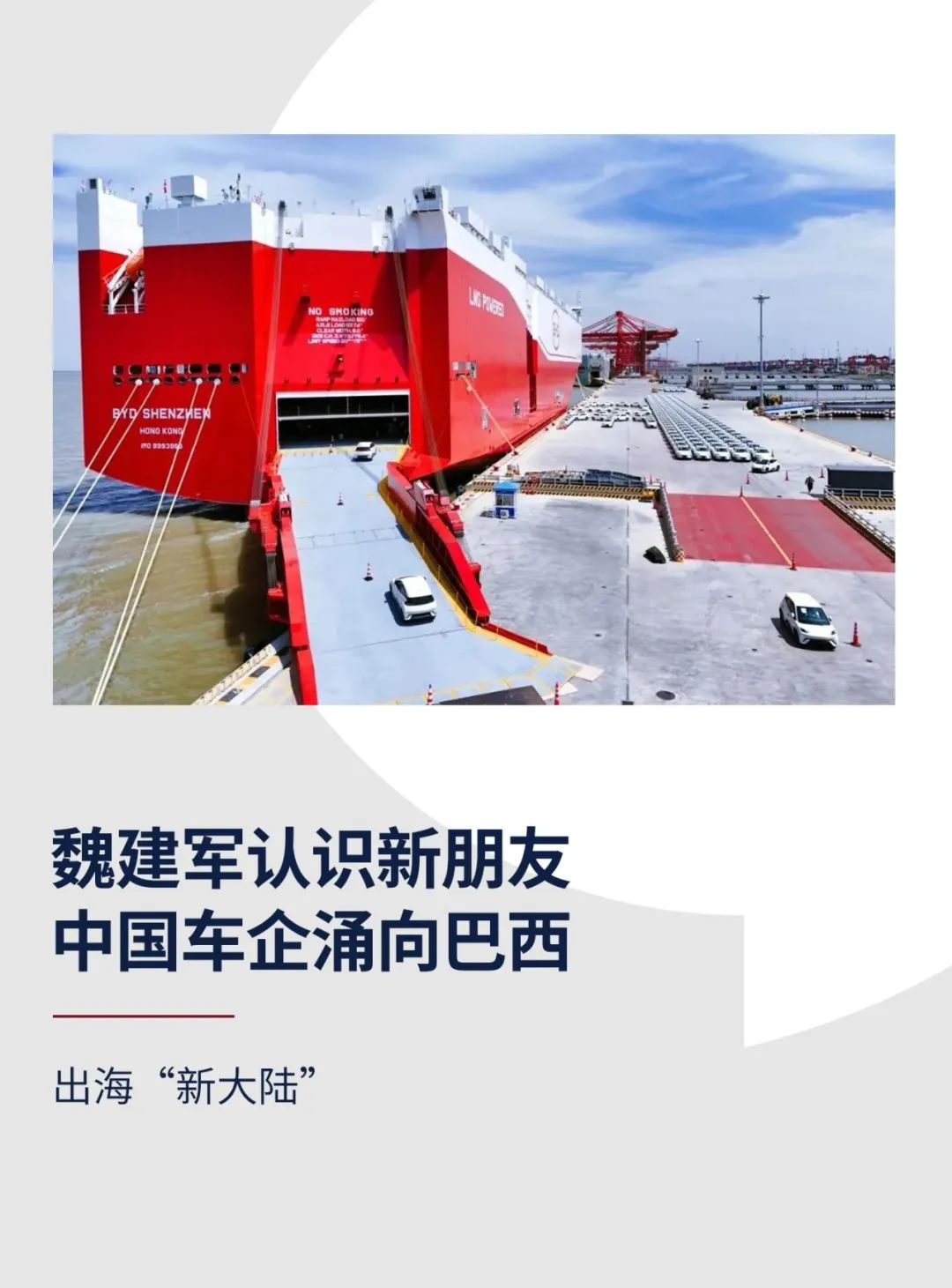
Author | Yang Lu | Editor | Li Guozheng | Produced by | Bangning Studio (gbngzs)
'Made a new friend today, Brazilian President Lula.'
On the evening of May 12, Wei Jianjun, Chairman of Great Wall Motors, posted on social media following his meeting with President Lula. He further noted that Great Wall Motors would 'continue to intensify investments and development in Brazil, utilizing the country as a hub for R&D and manufacturing in the Latin American region.' 'I invited the President to the opening ceremony of our Brazilian factory, and Lula joyfully accepted, heaping praise on Great Wall Motors' growth in Brazil.'
Lula arrived in Beijing on May 10 and attended the China-Brazil Entrepreneurial Seminar on May 12 to explore bilateral economic and trade cooperation opportunities. Lula emphasized that, as Latin America's largest economy, Brazil enjoys significant trade volumes with China. Despite rapid bilateral trade growth, 'this volume remains modest compared to the potential for exchanges and investment between our two countries.'
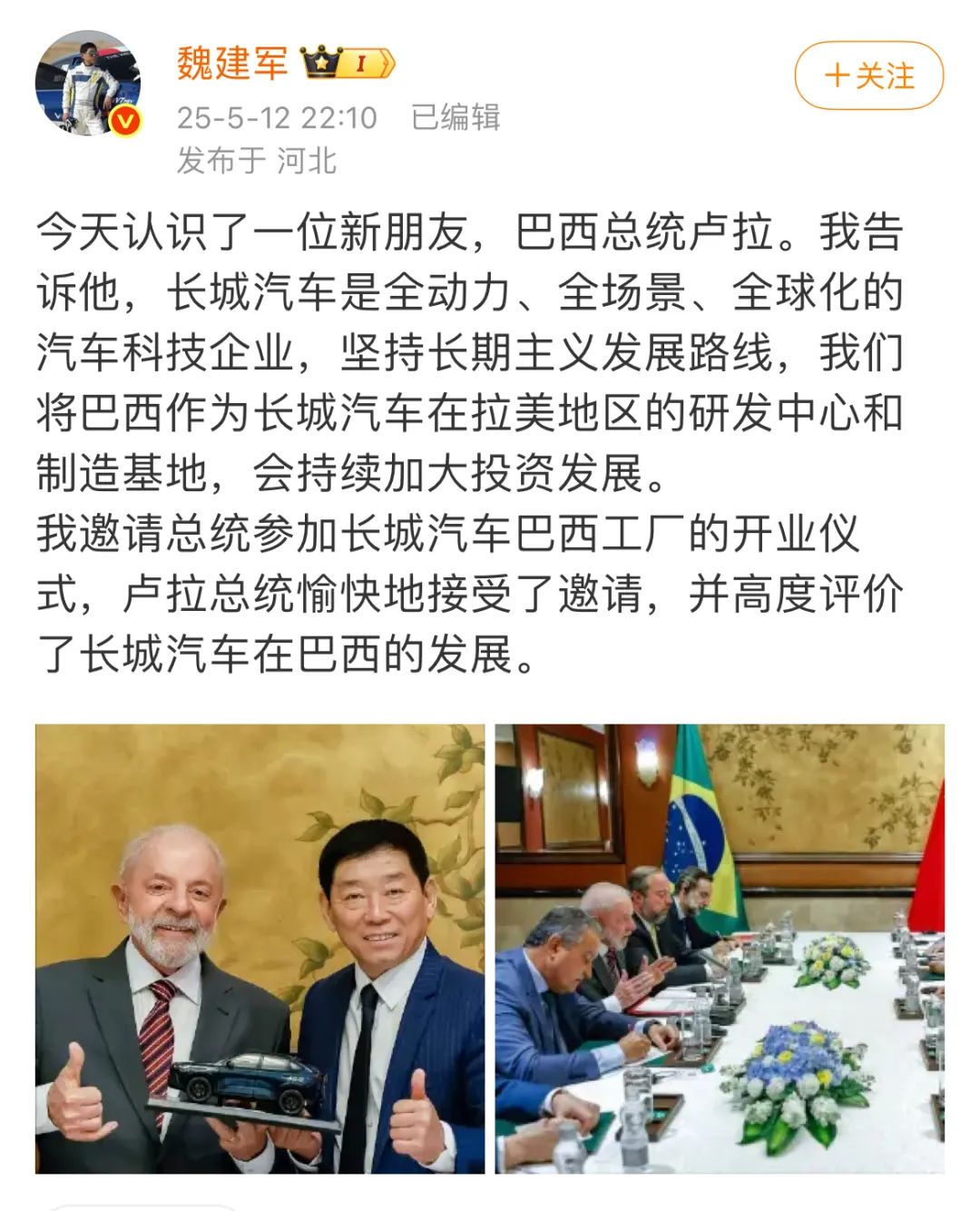
On May 13, Lula, joined by Colombian President Petro, Chilean President Boric, and delegations from other Latin American and Caribbean nations and regional organizations, participated in the Fourth Ministerial Meeting of the China-Community of Latin American and Caribbean States Forum.
During his China visit, Lula led a large business delegation in exchanges with Chinese firms, including Great Wall Motors and GAC Group. Great Wall Motors has maintained close ties with the Brazilian government. Last November, Lula met with Shi Qingke, President of Great Wall Motors International, and expressed support for the company's development in Brazil.
As early as 2021, Great Wall Motors recognized the potential of the Brazilian market and acquired the former Mercedes-Benz factory in Iracemapolis, Sao Paulo, Brazil. The factory is anticipated to commence operations mid-year, initially producing three models with a capacity of 50,000 vehicles. By 2025, it aims to create at least 800 direct jobs, gradually increasing capacity to 100,000 vehicles, serving Latin America and generating over 2,000 direct jobs. Additionally, Great Wall Motors will establish an R&D center and manufacturing base in Brazil, fostering the development of related industrial chains.
In 2022, Great Wall Motors unveiled its Brazilian market strategy: investing over 10 billion reais (approximately RMB 11.5 billion) over the next decade to deepen local industrial chain integration.
In under two years, Great Wall Motors' dealer network has expanded to major cities and core regions in Brazil.
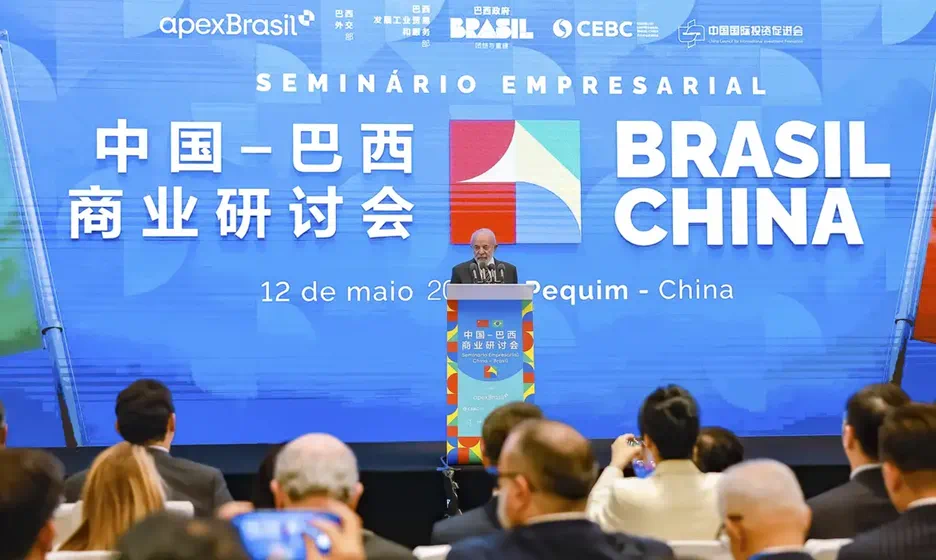
This time, Lula also met with Wei Haigang, General Manager of GAC International. GAC Group has clear intentions to invest USD 1.3 billion in Brazil, planning for localized production. It will also establish an R&D center in Brazil, fully integrating GAC's R&D system into the country.
It's not just Great Wall Motors and GAC Group. Other Chinese automakers, such as BYD and Chery, have also ventured into Brazil, all viewing the country as a 'golden land' for overseas expansion.
According to the Brazilian Automobile Manufacturers Association (Anfavea), new car registrations in Brazil totaled 552,000 in the first quarter of 2025, up 7.2% year-on-year. 'This positive performance indicates robust demand. Despite credit challenges, growth momentum persists,' said Alcélio Júnior, President of the Brazilian Automobile Dealers Association (Fenabrave).
Currently, almost all Chinese automakers view overseas expansion as a key development path, using Brazil as a springboard into the Latin American market.

Heading to Brazil
The globalization of China's manufacturing industry has broadly progressed through four stages.
Since the 1990s, roughly every decade has witnessed a cycle, with companies gradually establishing overseas factories. By the early 2020s, it became common for companies like Great Wall Motors and BYD to construct new energy vehicle factories in Brazil.
During the 2025 Shanghai Auto Show, Great Wall Motors unveiled its ONE GWM strategy. In fact, the 'ONE GWM' global action program was announced in 2022, aiming to achieve overseas expansion and brand upgrading through the combined efforts of its various brands. At last year's Beijing Auto Show, it also emphasized adhering to the international strategy of 'ecological expansion,' encompassing localized production capacity, localized operations, cross-cultural branding, and secure supply chains.
Reviewing 2024 financial report data, Great Wall Motors generated overseas market revenue of RMB 80.259 billion, accounting for nearly 40% of total revenue, with a year-on-year increase of 51.11%. Overseas sales reached 454,100 vehicles, up 44.61% year-on-year. During the same period, domestic sales were 780,000 vehicles, down 14.80% year-on-year. In other words, overseas markets have become the primary source of revenue and sales growth for Great Wall Motors.
Wei Jianjun once stated, 'The domestic market is a stock competition market, and Chinese brands can only continue to expand sales by venturing overseas.'
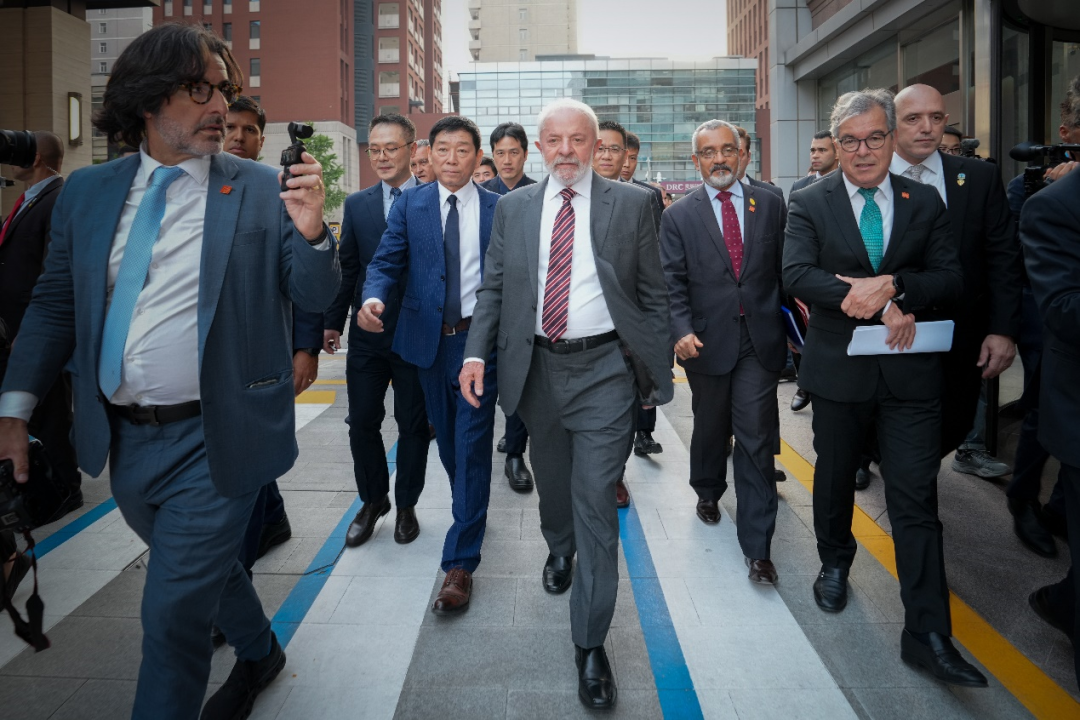
'The overseas market is an area where Great Wall Motors is striving to expand,' said Li Ruifeng, Chief Growth Officer (CGO) of Great Wall Motors, in an interview at the 2025 Shanghai Auto Show. 'We will swiftly introduce new models launched in China to overseas markets based on market demand, leveraging generational differences to promote them globally and increase sales. We set annual goals, but sales targets are internal stage indicators to motivate colleagues.'
Currently, Great Wall Motors exports to over 170 countries and regions but has only established vehicle factories in three regions, with Brazil being one of them.
Brazil is currently China's largest export market for electric vehicles.
Why has this country become a strategic market for Great Wall Motors and other Chinese automakers? This stems from local demand and characteristics of Brazil.
First, Brazil has a large population with a strong consumption desire among the middle class. With a population of 203 million, it is the seventh most populous country globally and second only to the United States in the Americas. Currently, Brazil's population is relatively young, with a median age of 33.6 years.
Second, the Brazilian government has introduced supportive policies. In 2023, after Lula's re-election as president, he launched the 'Carro Popular' plan, providing high subsidies to manufacturers to reduce car prices. Simultaneously, it offers convenient loans to expedite consumer loan approvals.
In 2018, the Brazilian government began implementing the 'Rota 2030' plan, aiming for 'electric vehicles to account for 30% of total car sales in Brazil by 2030.' In 2024, the plan updated its target, expecting to provide R$19 billion (approximately RMB 24.08 billion) in tax incentives by 2028 to promote the sustainable development of the automotive industry.
In October 2024, Lula signed the 'Future Fuels Law,' further encouraging the production and use of ethanol, biodiesel, and sustainable aviation fuels, driving Brazil's energy transition. Simultaneously, relevant departments submitted a proposal to the Brazilian National Energy Policy Council (CNPE), planning to increase the ethanol blending ratio in gasoline from the current 27% to 30% by 2025, reducing fuel costs and promoting the biofuel industry.
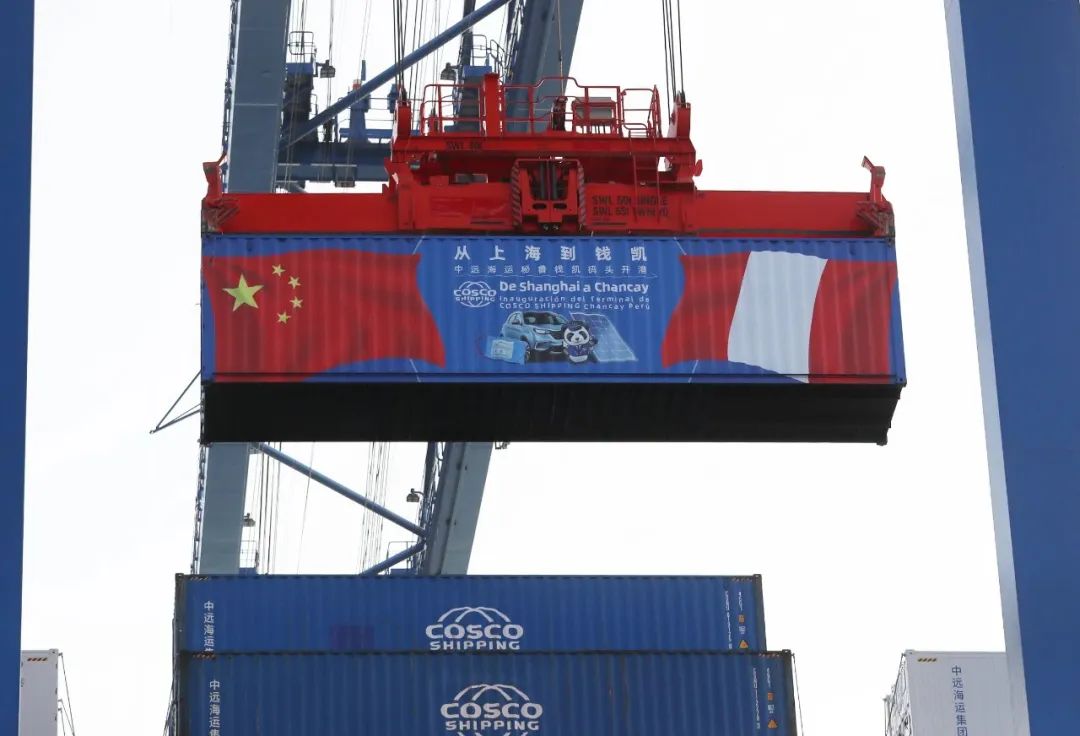
The booming development of China's electric vehicles coincides with Brazil's strategic planning.
With domestic demand for new energy vehicles becoming saturated and competition among automakers intensifying, overseas expansion has become a core business. Globally, new energy vehicle markets in Southeast Asia, the Middle East, and Latin America remain blue oceans. Moreover, in line with energy transition goals, Brazil's new energy vehicle market holds immense growth potential.
Brazil is the sixth largest automotive market globally, trailing China, the United States, India, Japan, and Germany. However, in the new energy sector, the Brazilian market is still underdeveloped, presenting a significant opportunity for Chinese new energy vehicle brands.

Brazil: A Tough Nut to Crack
Financial writer Wu Xiaobo wrote in an article, 'Chinese companies going overseas is both a once-in-a-century opportunity and a life-or-death situation for second-time entrepreneurs.'
Facing 'entrepreneurial' opportunities, using Brazil as a gateway to the Latin American market has been a common strategy for some Chinese automakers in recent years.
At the end of April this year, over 7,000 BYD new energy vehicles 'rode' the BYD 'Shenzhen' ship to the port of Itaguaí, Brazil. According to the Brazilian Electric Vehicle Association (ABVE), in 2024, total sales of new energy vehicles in Brazil were approximately 125,000, with BYD accounting for 61.2% market share, followed by Great Wall Motors and Volvo.
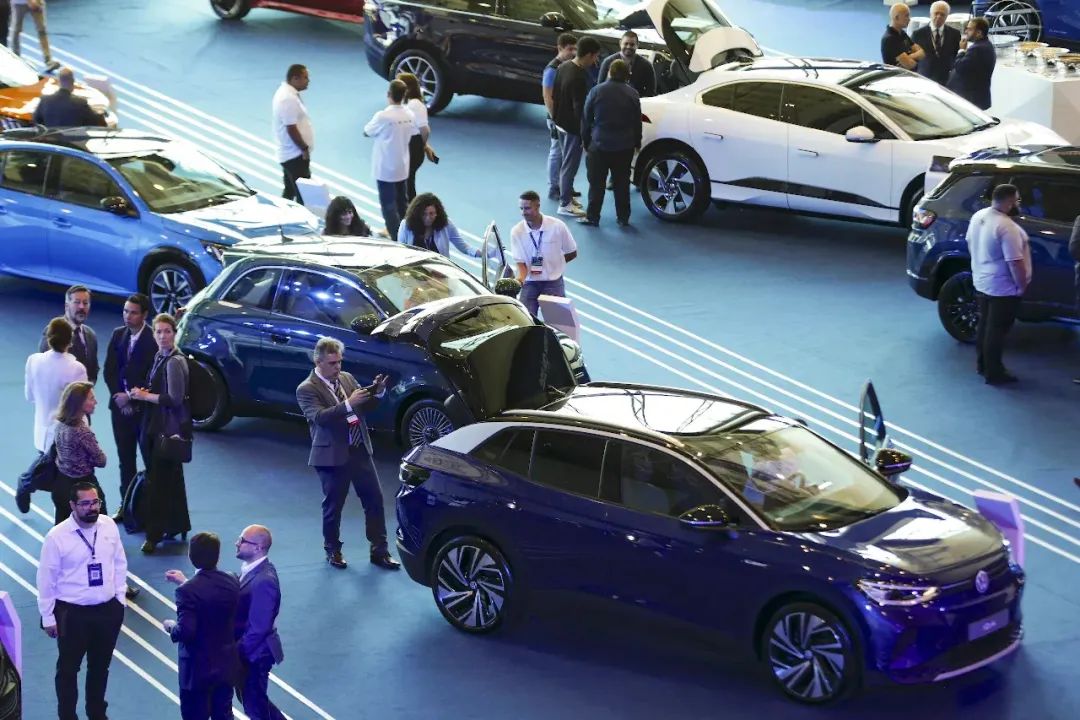
On February 18, Geely Holding and Renault Group announced they would expand cooperation in zero-emission and low-emission vehicles through Renault Brazil. Consequently, the Ayrton Senna integrated factory of Renault Group in Parana will not only produce existing Renault models but also new models from Geely Holding and Renault.
This year, Changan Automobile completed the establishment of its Brazilian subsidiary, marking one of the five major events in Changan's overseas strategy.
Chery Automobile's overseas expansion began even earlier. In 2014, Chery had already established a factory in Brazil and is now a representative of local mid-to-high-end models, with the Chery Tiggo 8 serving as the exclusive police car in Brazil.
'Brand expansion overseas is a hot topic, and about 70% of the Chinese entrepreneurs we contacted last year were discussing this issue,' said Zhang Yun, global CEO of Ries Strategic Positioning Consulting. The intense domestic competition forces Chinese companies to venture overseas, and in this wave of expansion, companies with a clear self-positioning will gain a first-mover advantage.
However, the path to overseas expansion is not as rosy as imagined.
Currently, companies going overseas have shifted from exporting products to local production. However, during localized construction, Chinese automakers may encounter numerous challenges, including tariff systems, labor rights, and the protection of local enterprises.
Since July last year, Brazil has increased the import tariff on new energy vehicles to 18%, implementing a tiered tariff system. It is anticipated that by July 2026, the relevant tariff rate will rise to 35%. In the first four months of 2024, China's exports of passenger vehicles to Brazil increased by 372.4%, totaling USD 762 million, representing the last wave of exports before the tariff adjustment. Since June last year, export volumes have declined.
Regarding labor regulations, the Brazilian Labor Code stipulates stringent labor protection measures, including a maximum workweek of 44 hours and an overtime pay system. Foreign companies in Brazil must adhere to these regulations to ensure fair worker interests. Last year, the Brazilian Ministry of Public Labor sued a Chinese automaker's Brazilian factory for poor working conditions, leading to the factory's suspension of operations.
However, the hiring practices of local companies in Brazil present a different picture. They tend to hire labor through informal contracts, resulting in a continuous decline in the number of formal contract employees and a sharp increase in gig workers in the gray economy. But for foreign companies, including Chinese automakers, this is not permissible.
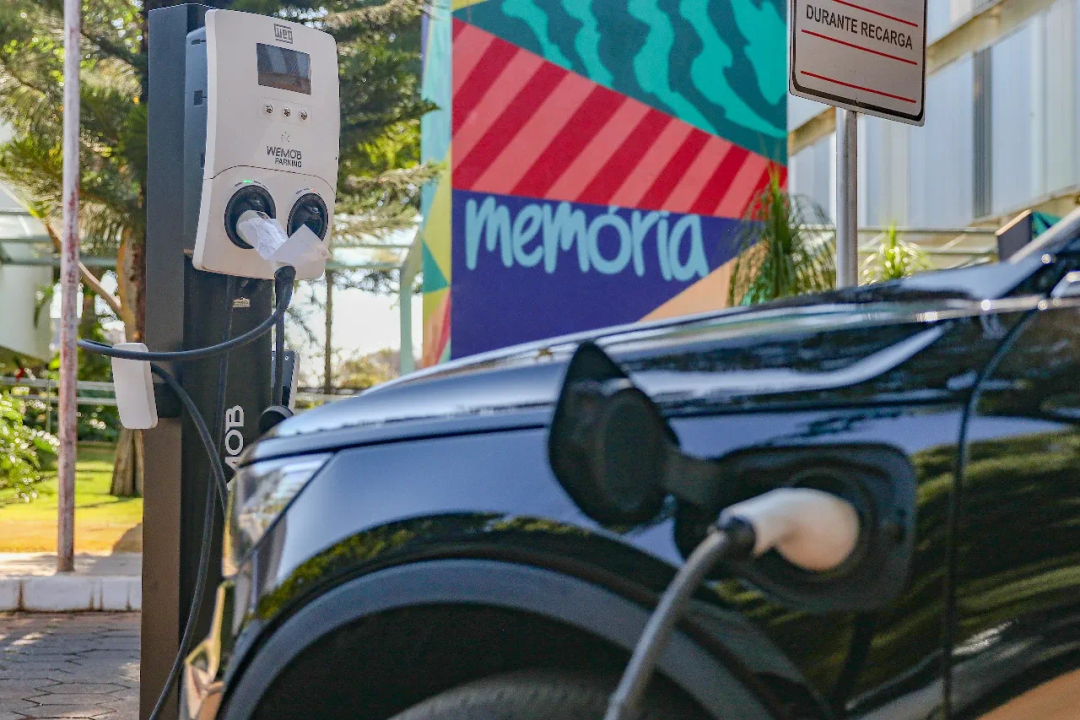
Furthermore, the Brazilian government's series of support measures for new energy vehicles are fundamentally aimed at fostering local enterprises, and the influx of Chinese automakers will impact them.
Recently, the Brazilian National Association of Motor Vehicle Manufacturers urged President Lula to initiate an anti-dumping investigation against Chinese new energy vehicle companies. If found true, these companies will face high punitive tariffs. Currently, the Lula government has not responded, but the association has announced the commencement of an investigation.
Philip Schimmer, the former head of Mercedes-Benz for Brazil and Latin America, stated that protectionist policies have adverse effects, a sentiment he knows well. The current protectionist trend in the United States concerns him. The Mercedes-Benz automotive factory in Sao Paulo, Brazil, closed in 2020.
Despite the challenges, Chinese automakers remain ambitious.
Great Wall Motors has announced its ambition to achieve a 60% localization rate for parts and components used in vehicles manufactured in Brazil by the close of 2026. Nevertheless, realizing this objective will present significant challenges. To facilitate this, the company may consider relocating subsidiaries specializing in auto part production to Brazil for localized manufacturing and operations.
Currently, Brazil stands as BYD's largest overseas market and Great Wall Motors' third-largest, following Russia and Australia.
From Brazil's perspective, as the leading automotive market in Latin America, it serves not only as a destination for foreign companies expanding abroad but also as a nation in need of introducing and co-creating global technologies. As President Lula emphasized at this year's China-Brazil Business Seminar, 'Our relationship is unbreakable, for China needs Brazil, and Brazil needs China.'







